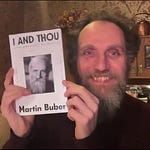At the beginning of the 1960s, Ivan Illich was charged with creating a language school and training programme for the influx of missionaries which the Catholic church had decided to send to Latin America. The result was the Centre of Intercultural Formation, which had as its goal to take every young man who arrived believing himself to have a missionary vocation, and either convince him that he was mistaken, or see to it that he understood that he had more to learn from the villagers he was being sent to than he had to teach them. To Illich’s critics, this was proof that he was part of an “anti-missionary plot”; what they struggled to grasp is that he actually believed the truth of faith could best be served by a willingness to show up “empty-handed”.
I woke up with this story on my mind, after last night’s Sunday Session with
. Early in our conversation, I’d described her book Fully Alive as an attempt to share the treasures of Christianity with people who may never cross the threshold of a church or share the faith in which her life is grounded. What strikes me about the book is that it is not out to convince or convert anyone, yet nor does it feel like an attempt at taming, a further example of what refers to as the Church’s “endless compromises and nervy submissions to modernity”. So that was my curiosity, heading into the conversation: given its starting point, how come this book feels wild and vulnerable, rather than safe and watered-down?One place this takes us is to talk about fear. There’s something here that I’d heard Liz say before, speaking about the Bible: “There’s a lot of invitation to lament, there’s a lot of invitation to grieve, there’s a lot of invitation to righteous anger – but ‘Do not be afraid!’ is all over the shop!” As I tell her, this has become a kind of litmus test for me, a way of navigating among the currents of Christianity: wherever fear seems to be dominant, or even encouraged, I’ll take this as a sign that something is astray.
Equally – and this is something we talk about in the later part of the session – I can think of plenty of people for whom Christianity itself is an object of fear, often with good cause. Again, there’s an acknowledgement of this running through Liz’s book, with no attempt to reason it away.
At one point in the conversation, I find myself saying that, as a reader, you can always tell whether an author has something at stake in a book, whether they were willing to come out of the experience of writing it as a different person to the one who went in. That is certainly true of Fully Alive and it’s one of the reasons why it doesn’t feel safe or tame. So before we went to Q&A, I asked Liz how she had been changed by the experience of writing this book.
To hear what she had to say about that, you’ll need to watch the recording, and I hope you enjoy our conversation as much as I did. There’s a funny moment about thirty-five minutes in where my internet dropped out and Liz was left to hold the fort, with help from Fabrice. I’ll cut that from the YouTube version, but it’s left in here, and paid subscribers can watch the Q&A where we pick up on Fabrice’s question and others from
, , and .Thanks to everyone who joined us last night – and to all the paid subscribers whose support makes these sessions possible. The next Sunday Session will be on 2 June, when I’ll be talking with M. R. O’Connor about her remarkable book, Ignition: Lighting Fires in a Burning World. And meanwhile, a reminder that there are still places available for the Further Adventures in Regrowing a Living Culture series which starts later this week.
Paid subscribers will find a full audio recording of this session below the paywall.
Shownotes
Liz’s book, Fully Alive: Tending to the Soul in Troubled Times is out on Thursday and available for preorder here. Her Substack is also called
and she presents The Sacred podcast.Liz mentions my recent post, Doing the Internet Right.
We talk about the micro-monastery in south London where Liz and her family live and it reminds me that I hosted an earlier session in this series with Michael Reynolds from their home.
Alain de Botton’s Religion for Atheists.
Francis Spufford’s Unapologetic from which Liz borrows the expression, “The Human Propensity to Fuck Things Up”.











